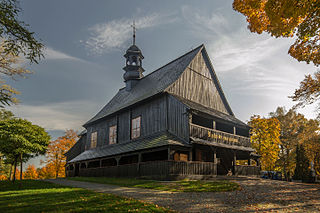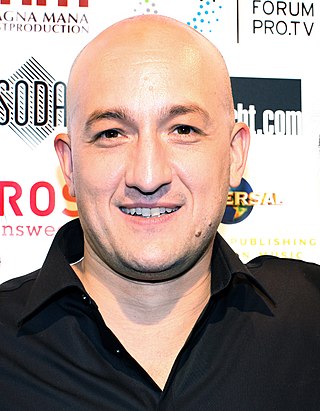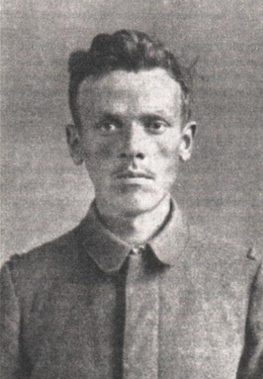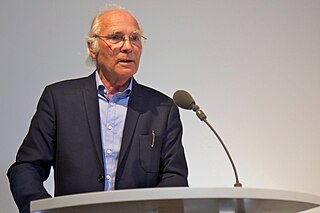
Matthias Blazek (born 1966) is a German local historian and journalist.

Matthias Blazek (born 1966) is a German local historian and journalist.
Matthias Blazek was born in Celle and spent his youth in Hanover, where he completed his Abitur at the Lutherschule Hannover in 1987. [1]
From 1987 to 1999 he served as a military signaller in the German Army, including five years at the German military base in Fontainebleau, France, from 1994–1999. From 1999 to 2002 he completed his studies at the College of General Administration in Hildesheim. Today he lives with his family in Adelheidsdorf. [2]
Since 2001 Blazek has voluntarily served as a municipal councillor; initially as a citizen member of the SPD, then as an independent member of the Group of Citizens for Adelheidsdorf. He led the Finance Committee of Wathlingen from 2006 to 2011 and is currently the leader of the group Alliance '90/The Greens Council of Wathlingen. [3]
Since 1997 Matthias Blazek has written numerous local history books and scholarly articles. From 2007 to 2008 he was editor of the Celler Blickpunkt. His articles frequently appear in the Cellesche Zeitung , especially in the special supplement „Sachsenspiegel“ (Saxon Mirror). [4]

Faßberg is a municipality in the district of Celle, in Lower Saxony, Germany. It is situated approximately 35 km north of Celle, and 30 km west of Uelzen.
Magister Wigbold , , also called “Master of the Seven Arts” was a German pirate who belonged to the famous Likedeeler pirates of Klaus Störtebeker who were active in the North and Baltic seas. Wigbold was one of the most noted Likedeeler, along with Gödeke Michels and Störtebeker. The nickname Wigbold comes from wig (strife) and bold. Whether Wigbold was a nickname, or possibly his real name, is unknown.
Imanuel Geiss was a German historian.

Dobrzeń Wielki is a village in Opole County, Opole Voivodeship, in south-western Poland. It is the seat of the Gmina Dobrzeń Wielki which has been officially bilingual in Polish and German since 2009. It is situated approximately 13 km (8 mi) north-west of the regional capital Opole. It is bordered by the Popielów municipality to the west; the Pokój municipality to the north, the Murów and Łubniany districts to the east, in addition to Opole city and the Dąbrowa and Lewin Brzeski municipalities to the south.

Lorenz von Westenrieder was a well-known author and historian in Bavaria and a critic of the Elector Karl Theordor and supporter of Maximilian IV Joseph. There are several memorials to him in Munich.

Baven is a village in the municipality of Südheide in the north of Celle district in Lower Saxony, Germany. It lies on the western edge of the Südheide Nature Park, on the Lüneburg Heath and currently has a population of 1,638.

Lorenz Schwietz was Royal Prussian executioner from 21 June 1900 to 29 January 1914. Responsible for carrying out capital punishment in the Prussian provinces, he executed a total of 120 to 123 people, primarily by beheading with an axe, but also with guillotines.

Albrecht Behmel is a German artist, novelist, historian, non-fiction writer and award-winning playwright.

Crown of Creation is a band from Hanover, Germany. The band developed its own musical style: pop music with strong trance influences.
Friedrich Reindel was Royal Prussian executioner from 1873 to 1898. Responsible for carrying out capital punishment in the Prussian provinces, he executed a total of 213 people by beheading with an axe.
Das Volksrecht was a left-wing newspaper published from Offenbach am Main, Weimar Germany between 1925 and 1933. Initially it was an irregular publication of the communist city council group, but in 1928 it became a local mouthpiece of the Right Opposition. It was published on a weekly basis until the National Socialist takeover in 1933.

Friedrich Schumann was a German serial killer. He is also known as "Massenmörder vom Falkenhagener See". Schumann murdered seven people and raped 11 women. He was 28 years old when he was executed in 1921.
Franz Friedrich Carl Gröpler was Royal Prussian executioner from 1906 to 1937. Responsible for carrying out capital punishment in the Prussian provinces, he executed at least 144 people, primarily by beheading with an axe, but also with guillotines. Gröpler was one of the most famous executioners in Germany.

Rudolf Schieffer was a German historian specializing in medieval history. From 1994 to 2012 he was president of the Monumenta Germaniae Historica.
Ilko-Sascha Kowalczuk is a German historian and author. His work is focused on the German Democratic Republic and its Ministry for State Security.

Theodor Bergmann was a German agronomist and published author. Until 1981 he was Professor for international comparisons in agrarian policy at University of Hohenheim. Bergmann was “the last participant and eyewitness to the German labor movement of the Weimar era”.
Kleinburgwedel is a village and northeastern lying district of the city Burgwedel in the region Hannover in Lower Saxony.
Michael Maaser is a German historian, archivist of the Goethe University Frankfurt.
Heinrich Sievers was a German musicologist, music critic, university lecturer, and conductor. He was regarded as an authority on the history of music in Hanover and Lower Saxony, and wrote music-historical monographs in English and Finnish publications.

Helmut Bley is a German historian. He is professor emeritus for modern and African history at the historical seminar of the Leibniz University Hannover.